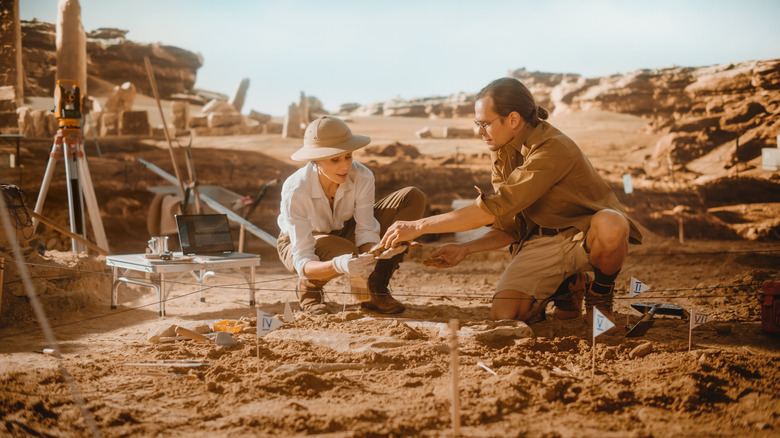The Oldest Sentence Ever Written May Be From 1700 BC
The oldest known sentence may have just been discovered, and it's not what you would expect. Researchers recently published a paper in the Jerusalem Journal of Archaeology translating a sentence found inscribed on an ivory comb used for removing head lice. The New York Times reports that words written on the comb simply state, "May this tusk root out the lice of the hair and the beard."
Professor Yosef Garfinkel, an archaeologist at the Hebrew University of Jerusalem who assisted in the comb's discovery, describes the words written on the comb as "very human," stating (via The Guardian), "You have a comb and on the comb you have a wish to destroy lice on the hair and beard. Nowadays we have all these sprays and modern medicines and poisons. In the past they didn't have those." The plea engraved into the comb still feels relatable today, even with modern medicine, while also reminding us of the humanness of our early ancestors.
It was maybe created around the same time as the first written words
The lice comb was found at an archaeological site in the Canaanite city of Lachish and is estimated to be from 1700 B.C. However, carbon dating was unable to confirm when it was created (via The Guardian). This would place the comb around the same time period as the invention of the first alphabet, which is believed to be around 3,800 years ago, although some research places the alphabet's invention earlier than that, according to New Scientist.
While the comb is estimated to contain the oldest written sentence, it is important to note that there was written language before the first alphabet was invented. According to The British Library, the first known written language is a cuneiform script in Mesopotamia, which appears to be simple wedge-shaped marks imprinted into clay tablets or marked on papyrus using reeds over 5,000 years ago. Tablets with cuneiform and other scripts have been dated older than the ivory comb, as Oldest.org documents. But the comb still represents the first written sentence found that used an alphabet.
A reminder that we can still relate to ancient civilizations
While the translation of the Canaanite comb may not reveal anything unique, it gives us a better view of the lives of the ancient people who created it. It also reminds us of how troublesome lice can be, as we still struggle with getting rid of them today, and lice combs are often still used even with modern medicine available to assist in treatment. According to WebMD, there are now many more options for lice combs than ancient people would have had access to, but the struggle remains the same.
Christopher Rollston, professor of northwest Semitic languages at George Washington University stated, "The fact that this inscription is about ordinary life is especially fascinating. Throughout human history, lice have been a perennial problem. We can only hope that this inscribed comb was useful in doing that which it says it was supposed to do – root out some of these pesky insects" (via The Guardian).


